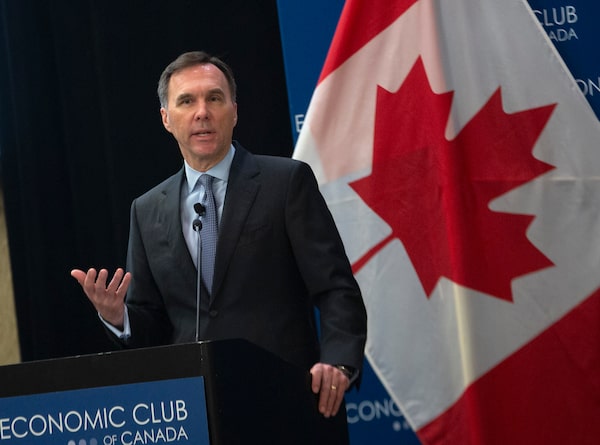
Finance Minister Bill Morneau speaks at an Economic Club breakfast, in Calgary, on Feb. 10, 2020.Todd Korol/The Canadian Press
The federal government is launching a new set of consultations with Indigenous groups that will determine if and how they might take part in ownership of the Trans Mountain pipeline and its expansion project, Finance Minister Bill Morneau announced Monday.
Up to 129 communities will be consulted over the next weeks to ensure they have a chance for “meaningful economic participation” in the Ottawa-owned pipeline, the minister said at an event in Calgary.
“This next step will be focused on different models of economic participation such as equity-based or revenue-sharing options and will seek to build momentum towards a widely acceptable option for the groups that we’re consulting with,” he said.
“We’ll also explore whether the participating communities are willing to work together, either through an existing entity or a new one.”
Several Indigenous groups have expressed interest in buying a stake in the pipeline, but the government hasn’t said when it plans to sell it.
As long as Trans Mountain is operated as a commercial enterprise, the industry will be supportive of its sale, said Chris Bloomer, chief executive of the Canadian Energy Pipeline Association, after listening to the speech.
“Anything that facilitates participation meaningfully with First Nations in these projects is a welcome thing. Having a deliberate approach to it, I think, is good,” he said.
In his speech, Mr. Morneau said he sympathizes with Albertans who have lost jobs because of an economy hit by a capital-investment slide and discount prices for oil and gas as export capacity fails to keep up with gains in production.
The novel coronavirus is also having a negative effect on Canada’s economy, he said, pointing out oil prices are down by about 15 per cent because of the spread of the illness, a result that hits the West harder than the rest of the country.
A Federal Court of Appeal ruling last week that set aside a challenge of the Trans Mountain expansion project by four B.C. First Nations is important for the Western Canadian economy, he said.
The court found that the government had met its duty to consult, thus clearing one of the last major hurdles for construction to continue on the conduit from the Alberta oil sands and refining hub in Edmonton to the B.C. coast.
The federal government will earn a return on its investment when it sells Trans Mountain, Mr. Morneau added, despite the release last week of a new construction cost estimate for its expansion of $12.6-billion, an increase of 70 per cent over the previous forecast of $7.4-billion.
“We believe this new estimate is realistic and we remain confident that when it’s the appropriate time to sell, we will see a profit on this investment,” Mr. Morneau said.
The government expects to earn $500-million a year in taxes from Trans Mountain after the expansion begins operating, he added.
Our Morning Update and Evening Update newsletters are written by Globe editors, giving you a concise summary of the day’s most important headlines. Sign up today.